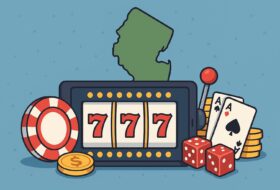
Online gambling isn’t only a game for the rich. A broad range of income demographics are represented in online sportsbooks and casinos, but the split between wealthy and impoverished players isn’t always even. Studies both in the US and the UK support this.
In the UK, the poor play online games and slots just as often as the wealthy, according to recent research. The high earners, low earners and middle group are all 3% to 4% likely to play online casino games and slots at least once per month. The UK study defines “high earners” as those making more than twice the national median, and “low earners” as those making less than 75% of the median.
In the US, however, the numbers look less even at first. Here, about 26% of those with an annual income of $100,000 or more gamble online in some form. Only 23% of those making less than $25,000 do the same.
However, the lowest prevalence is among US iGaming players earning between $25,000 and $49,999. Only 19% of that latter group is likely to gamble online.
US and UK studies involve different methodologies
It’s important to note, however, that the US stats lump all forms of online gambling together: Sports betting, daily fantasy sports, poker, table games, slots and more. These US figures come from the study titled National Survey on Gambling Attitudes and Gambling Experiences, which the National Council on Problem Gambling (NCPG) released in March.
The UK numbers from research released on Nov. 26 by YouGov treat online sports betting separately from the casino vertical. That report doesn’t include other products like online poker or DFS at all. Online sports betting, unlike online casino gaming, does show a correlation with income, which may explain the trend in the US aggregate numbers.
Lottery games win in both countries
In the US and UK, lottery games see the most players. Also in both countries, the affluent are the most likely cohort to buy tickets.
Among the British who buy Euromillions tickets, about 26% are wealthy, 21% are poor and 23% are in between.
The research titled Gambling Habits of High-Earning Brits states:
“Overall, the transnational lottery is by far the most popular form of gambling in the UK.”
The US study provides percentages within the income brackets, rather than a total of bettors. Therefore, 68% of American lottery ticket buyers earning $100,000 or more can be directly compared with the 61% of low-income ticket buyers.
UK online sports betting is second in popularity
While the lottery is the most popular game in the UK, online sports betting is a firm No. 2.
In the UK, almost twice as many wealthy Brits place online sports bets (12%) as the poor (7%).
YouGov says the wealthy bet more – 9% wager at least £100 during the year – and play more frequently:
“Separate YouGov variables show the nation’s wealthy population is more likely to feel that betting helps them feel more engaged with sports they like (16% vs. 14% of all British adults). Spending data shows 6% of wealthier Brits put down at least £100 [a month] on online bookmakers, compared to 4% of Brits overall.”
NCPG’s research also enables comparisons to the UK study’s figures. 42% of those earning $49,999 or less a year place sports bets in the US. Notably, 28% of those making $150,000 or more annually bet on sports in a calendar year.
In the US, online gambling is more popular among the rich
While the UK study shows wealthy Brits play online games and slots as often as the poor, that’s not the case in the US.
US online gambling customers tend to be high earners, NCPG finds.
In the US, 26% of those earning more than $100,000 annually gamble online in one form or another. Those with incomes between $75,000 to $99,999 per year gamble at almost the same rate, at 25%.
The middle income brackets show the lowest rates of online gambling, at 20% for those earning $50,000 to $74,999, and 19% for those earning between $25,000 and $49,999. The rate rises again for the very lowest bracket, those earning less than $25,000
Sports betting, which includes retail betting, shows a similar trend, but is even more popular. In the income demographics of $100,000 to $149,999 and $150,000 plus, 28% of US bettors say they wager on sports each year, 2% higher than that demographic’s online gambling rate. (The NCPG’s study includes one more income band for sports betting than for online gambling.)
Even so, US online casino revenue far outpaces that of online sports betting.
Wagers can be smaller online
If the UK research shows online gambling is a great equalizer between the rich and the poor, it may be because bets can be far smaller than those required in retail casinos.
For instance, the Connecticut Lottery Corporation’s (CLC) skin – PlaySugarHouse Sportsbook – saw wagers average $45 during the sportsbook’s soft launch in October. Illustrating that online advantage, the largest wager was nearly $1,800, and the smallest was 10 cents.
However, US retail casino play rises with income.
According to NCPG, about 49% of survey respondents saying they earn $150,000 or more gamble in retail casinos. The rate is 45% among those making $100,000 to $149,999.
The figure drops to 28% among the more penurious players generating $25,000 or less in annual income.
Perhaps casinos that are online and not on land provide more even ground for players.





